GENTLE, POSITIVE WEANINGWhile the word "weaning" often conjures up images of wailing babies and swollen, painful breasts, gentle, baby-led weaning is often so gradual and natural a process that mother may not even remember the exact day or even week that her little one weaned from the breast. Gradual weaning is gentler on both mother and baby. I use the term "positive weaning" to describe this style of weaning. Instead of abruptly removing a child from the breast, positive weaning is a mindset that respects the child's developmental readiness and views weaning as a process. Being "fully weaned" is a milestone and achievement, like mastering how to use the toilet, learning to ride a bike, or learning to read. Positive weaning also respects the mother's needs and bodily integrity, since the process of weaning may often be the child's first exposure to the idea that each person's body belongs to that person, and their first experience of respecting that others can, and will, say "no" to him or her on occasion. These important lessons have many benefits for the child long into the future. INFANT MASSAGENo matter how they are fed, newborns benefit from infant massage as they transition from womb to world. For a young child, touch is as vital to life as milk. Infants who regularly receive infant massage cry less, develop faster, and have fewer discomforts. Infant massage is a wonderful way to encourage your baby's health and well-being while bonding with your child. JOYFULLY WELCOMING A NEW SIBLINGFor many children, their special time as the "baby of the family" will come to an end when a new sibling arrives. The uncertainty of how their child will handle this transition is often a source of considerable worry for parents during pregnancy. Often in books or shows on this topic, the older sibling is portrayed as jealous and the parents or grandparents as only interested in the new baby, and in my opinion, these negative depictions plant seeds of worry and pessimism in the older sibling that may contribute to a long-term "sibling rivalry." My own experiences as a mother of seven have taught me that this transition is easier on the new big brother or sister when the older child is involved in the pregnancy; for example, attending prenatal care or ultrasound appointments; looking at ultrasound photos together; or helping to pick out clothing or prepare the home for the new baby. It is beneficial if there have been age-appropriate discussions of the birth process and birth plans; as well as frequent discussions of what they can expect of a newborn, and how Mom, Dad, and Big Sister or Brother will care for the baby...all with a positive, excited attitude. During the typical challenges of pregnancy, and especially if complications arise during the pregnancy or birth, it is best to talk with your child in an age-appropriate way about what is happening to mommy or baby and how they can help, even if in very simple ways, like, "Please bring Mommy a glass of water." When the child does these precious acts of service, praise the child, letting him or her know what a great big brother or sister he / she already is. Empathy, gentleness, education, and encouragement will go a long way toward helping the young child to embrace this new role that, God willing, will last a lifetime. SCBP RESOURCES
0 Comments
2/16/2023 'ALL SMILES': MOTHER SHARES HOW BABY SIGNS HELP HER COMMUNICATE WITH BABY (INTERVIEW)Read NowIt was such a joy to have a dear young mom and her sweet first baby, Emma, in a recent Sign, Say, and Play baby sign language series. Here are the mother's thoughts about St. Croix Birth & Parenting's Baby Signs classes! Q: What reasons did you have for wanting to learn Baby Signs (R) with your baby? A: We wanted a way to communicate with Emma before she was able to do so by speaking so we could better respond to her needs and help her to feel empowered and connected. Q: Do you think Emma enjoyed the classes themselves? If so, how could you tell? A: Yes! Watching on the iPad for 45 minutes was beyond her so young, but she definitely engaged happily each time, and she really seemed to enjoy playing pretend dressing her Teddy—all smiles and excited sounds! Q: Did you ever see Emma use Baby Signs in her daily life? If so, what signs did she use? A: She is not signing yet, but she seems to watch our hands when we do. Q: Can you think of a time it helped you or other family members to use signs with Emma? A: We use them as much as we can, especially “all done” and “more,” which I think has really helped us with feeding but also when we have to change activities or redirect her to say we are “all done”! Emma always smiles when we sign “dog”! We definitely think they will help as her capacity to comprehend the signs and then to use them grows! Q: Is there anything you would say to parents or caregivers about using baby signs with babies? A: It is fun, functional, and building strong connections between my baby and me and in her brain as she already develops her neural pathways for language before she can ever speak. Q: Would you recommend SCBP Baby Signs (R) classes? A: I already have to several moms! Thanks so much for this wonderful feedback!
8/12/2021 supporting new MOTHERs during a loCkdown: a guide for friends and extended familyRead NowThe coronavirus pandemic has changed life as most of us once experienced it. Many areas of the world are in lockdown, and even in areas where things have opened up, as the number of COVID-19 cases spikes again, we will likely face more social distancing measures or quarantines to try to slow the spread (if we aren't already). For some new mothers, this slower, more home-based pace of life has been a good thing. These moms report that being quarantined with their babies has helped them breastfeed, since - just to mention one thing - being separated from a nursing baby tends to make maintaining a milk supply more challenging and if nothing else, lockdown gives us lots and lots of time with our immediate family members. But in other and important ways, social isolation is not great for new mothers. Many important services that mothers need, including lactation help, have been more difficult or impossible to access during lockdown. Aside from access to healthcare, all mothers need other mothers, friends, sisters, cousins, grandmothers, aunts...we need our sisters and our sage femmes to let us know we're not alone; we're loved; we're doing a good-enough job; our kids are normal (usually); and, if they're not, to have faith that eventually, this too shall pass. Lockdowns put a lock on these face-to-face and side-by-side moments...natural social interactions which normally serve to lower our stress levels and restore us - "enhope" us. And all this goes quadruple for new mothers. Dealing with lochia, sore nipples, night feeds, blow outs, the constant guessing games that a newborn brings (a/k/a no instruction manual), keeping a brand new non-verbal human thriving and growing, and caring for everything "down there" is just a lot. In some idealized past, we imagine our ancestral mothers got to lie around while their loving, supportive kin waited on them hand and foot. Sure, maybe that happened sometime, somewhere, but envying our long-departed great-great-grandmother's "lying in" is not really going to help you get through this painful feed, on this lonely day, at this ungodly hour. So let's break this down. New mothers have physical needs. Food, water, monster sized maternity pads (in the beginning), menstrual pads later on, baths or showers, and (eventually) clean clothes. If you love her, ask about these things. If she needs something, help or ask someone else to help. Leave things on her porch, in her mailbox, send it unaccompanied up the elevator, or throw it through her window if you have to! (Or you could just give to the baby's dad, but that's not as fun.) If she's good with her physical needs, I guarantee she has emotional needs. Call and ask about her birth. Listen. Bite your tongue if you find yourself starting any sentence with the words "at least." Listen. Celebrate the good stuff with her. Mourn with her anything she found sad. Share her anger if anything made her mad. Don't tell her what she should have done differently. Listen. Are you listening? Keep listening. No matter what, make sure to let her know how amazing she is. No one in the history of the world had her birth. It was her adventure and she is a heroine for having done it! Call another time and ask how things are going with the baby. Celebrate the joys. Mourn the things that aren't going so well with her. Did I mention don't tell her she should have done anything differently? She is probably already beating herself up about something. If her baby is growing and developing, she's doing a great job. Tell her. If her baby is struggling, offer to help. If she's got other kids, depending on your local situation, you might be able to have someone in mom's social bubble bring the baby's older siblings somewhere outside for a socially distanced / masked playdate so she can visit (whether in-person or virtual) with the doctor, or the chiropractor, or the lactation consultant, or whoever it is she thinks can help. Moms grow in confidence and feel capable when the people around them support their decisions about their baby's care. Be that person (even if you secretly disagree). Being a great friend / sister / mother / mother-in-law, etc., means supporting the new mom's efforts to become a mother, a big part of which is taking responsibility for her baby. And chances are very good that if the baby continues to struggle, even after that visit with [insert name here] she will try something else, and something else, and something else, and maybe, when she's tried everything else, she may even ask you for your advice! Now is your moment. A few days or a week later, call her again. And then again. And yet again. And pretty soon she will blossom and her tiny baby will become a chunky monkey, roll over and crawl and take his first steps, and life will settle and she will never forget that you were there, on the sidelines, cheering her on the whole time. Maybe you never carried a meal to her bedside on a solid-gold tray, but you were there. And maybe she'll tell her great-great-granddaughters about you and how you were there for her when great-grandpa was born, during the time of the world coronavirus pandemic. ways st. croix birth & Parenting can help
The self-proclaimed egalitarian lifestyle blog, Ezer, recently published a post titled "On Demand Sex Won't Meet Your Husband's Needs," by freelance writer and kindergarten teacher, Bailey, concerning the expectation of "on demand sex" within Christian marriage. Here are my thoughts on this topic, as a natural fertility educator and happy wife of almost twenty years.
In a genuine, loving marriage, one's spouse must be more than a convenient means to one's own pleasure--a perverse state which is in fact, self-love. In contrast, married persons are called to "love, honor and cherish" their spouses--as so beautifully stated in the traditional marriage vows. Elsewhere, Paul encourages Christian husbands to "love their wives as they do their own bodies" and to "nourish and tenderly care" for their wives as they do their own bodies (Ephesians 5:28). The proposed 'selfish' interpretation of this passage from I Corinthians seems strangely at odds with the entire Christian faith, which is one of self-sacrifice, not indulgence. And certainly, a Christian marriage, where husband is called to symbolize Christ, and the wife, His Bride, (cf. Ephesians 5:22-23) must not be self-seeking, but one of mutual love, tenderness, and care. Indeed, Paul tells husbands to imitate Christ who "gave himself up" for His bride (Ephesians 5:25). It is completely incongruous to imagine the same Paul who calls Ephesian husbands to give themselves up, even to the point of death, would here be giving Corinthian husbands carte blanche to indulge themselves in sexual intercourse at whim without concern for the desires of their wives. But what of the end of this passage, where Paul seems to criticize, or at least strongly caution against, the abstinence from sexual intercourse upon which natural family planning methods are based? While I haven't conducted a survey, there is no doubt a wide range of frequency of intercourse between individual marriages. And certainly, depending on the stage of life one is in, within the same marriage over time there will be seasons of frequent intercourse--and seasons of infrequent intercourse. Nonetheless, a loving marriage normally includes the good of intercourse as often as the spouses decide, as a beautiful means of uniting them, and delighting each other, as well as helping to bring children into the world, when they are so blessed. I do not believe that this passage is so much a condemnation or discouragement of natural family planning, so much as an encouragement that spouses not hurt the other by stubbornly refusing sex. My interpretation is based on the inclusion in 1 Corinthians 7:5 of that one important concept: mutual agreement. Any mature marriage will necessarily go through some periods in which sex cannot be a daily (or hourly!) habit, depending on busy-ness, illness, care of small children, work trips or responsibilities, etc. So surely Paul is not saying here that it is inherently dangerous for the couple to refrain from sexual relations from time to time. The concept of "on demand sex" is at odds with the practice of natural family planning, because on demand sex falsely elevates one spouse above the other, who is treated as an object. In contrast, the marriage enriched by the practice of mutual self-restraint calls the spouses to view each other as partners who are at least symbolically co-laboring on the work of building their family, by cooperating with their natures--whether the goal is to conceive a new child, or to avoid pregnancy, or even to accept whatever will come, but with 'eyes open' due to the awareness of the possibility of pregnancy (the vast majority of the time). A word of encouragement: for those with spouses who are at the beginning of this journey of self-mastery--the practice of natural family planning, with its inherent encouragement to cooperate together with the natural rhythms of fertility and infertility (depending on your pregnancy intention) is quite beneficial in encouraging growth in self-control, if freely chosen by both parties. I repeat: it must be undertaken with mutual agreement (as Paul so wisely encourages). Properly understood, I believe that this passage from 1 Corinthians must not to be taken as a license for one spouse to demand sex from the other, but for both spouses to humble themselves to each other, as they grow together in learning to more perfectly express the language of physical intimacy.
If you're anything like me, Father's Day may well be one of the harder shopping events of the year. Dad probably doesn't need another tie or coffee mug, right?! Here are 5 quick and useful Father's Day gift ideas!
4. The Man Pack at Pure Haven Essentials
To treat the hard-working Dad in your life, why not give him The Man Pack?! If he gets a few nicks or cuts during his labors, the Boo Boo Stick will help them heal--quickly. (And you can use the Boo Boo Stick on the kids' or grandkids' owies too!) After his hard day of work, the woman he loves can soothe his aching muscles with a nice back massage using a blend of Pure Haven Essential's Jojoba Oil and Cedarwood Essential Oil--and after a stressful day, diffuse Sweet Orange Essential Oil to lift his spirits. He can keep his beard moisturized and nourished with Pure Haven Essential's Beard Balm, containing organic sunflower seed oil, organic beeswax, organic olive oil, organic mango seed butter, organic jojoba oil, organic cocoa butter, organic grapeseed oil, and essential oils of sage and lime. (Yum!) Pure Haven Essential's Aftershave and Moisturizer naturally soothes razor burn and moisturizes his skin. You will find these products at the Pure Haven Essentials website in the categories for Men's Essentials (Beard Balm & Aftershave and Moisturizer); Kid's Essentials (Boo Boo Stick); and Oil Essentials (Jojoba Oil & Sweet Orange and Cedarwood essential oils). If you need help, let me know! I can place your order for you. $78.70 plus shipping and tax for the entire Man Pack
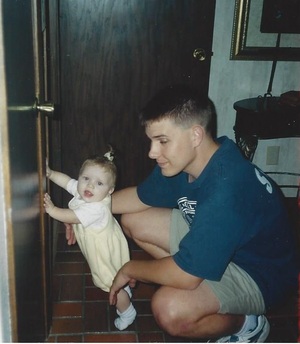 Chris & E-R shortly after his AK trip Chris & E-R shortly after his AK trip When our eldest daughter was nine months old, Daddy went to Alaska for his annual commercial salmon fishing adventure...er...business trip. The trip was to last for four weeks. The change in our normally exceedingly placid daughter was astounding. For three days, she cried inconsolably. We far underestimated how important her father was to her, even at such a young age. Needless to say, that was the last time Daddy left for such a long time. When Daddy finally returned, I took her to the airport to pick him up. I remember in vivid detail what happened next. He greeted us in his usual exuberant way. Ready to be done with my "adventure" in single parenting, I was thrilled to see him. She just looked at him for a brief moment and lost interest. She had forgotten her own father in four weeks. He sat next to her car seat on the trip home. He started joking and playing with her. Her eyes suddenly sparkled with recognition; one might even say with amazement. Sometime in that trip home from the airport, she realized that her long lost daddy had returned. According to CDC data from 2001-2006, Minnesota ranked as the sixth lowest state in the Union for maternal mortality, with 5 maternal deaths per 100,000 liveborn infants. Wisconsin’s rate was over double Minnesota’s with 10.9 maternal deaths per 100,000 liveborn infants, putting Wisconsin in the lower half of the states at 29th lowest. Compared to a maternal mortality rate of 12.1 for the United States as a whole, both Minnesota and Wisconsin are doing maternal health care rather well. But compared to the Healthy People 2010 goal of no more than 3.3 maternal deaths per 100,000 live births, both states have room for improvement. Recently, a 32 year old Minneapolis woman with a two week old infant suddenly died of unknown causes, though the death may have been related to a blood clot. Her sudden loss leaves a terrible hole behind in her family and community, and her loss is also experienced by her infant. 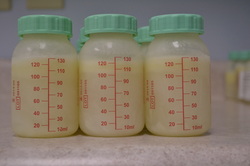 While, thankfully, most of us will not personally experience maternal mortality among our family or friends, it is important to be prepared should it occur. Those surrounding this Minneapolis family have rallied to their aid, offering practical help including breast milk donations. Offering mother’s milk cannot begin to fill the hole left by the death of the baby’s mother, but it does provide practical "next best" nourishment for the child, and no doubt eases the emotional strain on the surviving family. For those interested in learning more about donating breastmilk (though not directly to this family)—or those who need to be on the receiving end—the Health Foundations Family Health & Birth Center takes and offers donations, as does the University of Minnesota Medical Center, Fairview. Several other groups that have local chapters for milk sharing are Eats on Feets and Human Milk for Human Babies. Donors are most often breastfeeding moms who pump or express milk above their own baby’s needs, milk that can be shared with another baby. A less commonly known source of breastmilk is the mother who has lost a baby. It is possible to pump or express and collect milk for a time to donate to another baby in need, a gift known as “Legacy Milk.” For more information, please contact me. 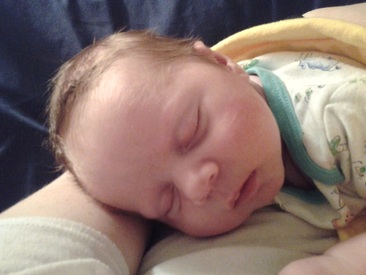 While her milk is invaluable to her baby, a mother is more than just a source of food and comfort. Even very young babies grieve the loss of those closest to them. All babies, especially very young ones, need lots of holding and attachment. For babies who have lost a mother or father, this need is even greater. It is ideal if another person can take up where the mother was forced to leave off due to her unexpected passing away—helping the baby to bond with one other person is key to the baby’s normal emotional development. The infant will need lots of holding and skin-to-skin contact. Swaddling and infant massage will also help baby to feel more secure during this difficult time. Talking with the infant about what happened is important; even if he or she does not understand the meaning of the words, the tone of understanding that baby misses his or her mother and your desire to be a source of comfort will come through loud and clear. It is said that the hardest thing a parent can endure is the loss of a child. It is not as commonly said that the hardest thing a child can endure is the loss of a mother (or father). Simply because a person cannot express his or her sorrow in words does not mean it does not exist. Baby may express his grief in long bouts of crying, or in sleeping more—or less—than usual, or changes in feeding patterns. While it is crucial that the very young baby form a close attachment to one person, it may feel overwhelming for a widower to cope with these changes in the baby’s behavior in addition to dealing with his own grief. Friends and extended family can be a real blessing if they pick up the slack and spell the surviving parent or other caregiver with the tasks of feeding, holding the baby, changing diapers, giving the survivor an opportunity to shower or eat a meal, providing meals, housecleaning, or helping with the care of older children. Simply knowing that you are praying for them will give them courage and hope. Surrounding the infant and his or her family with love and support is an invaluable gift that will help the family—and the baby—to recover in time. The family will never be the same as it was before, but it will develop a new normal and can grow strong again. For More Information: Alan D. Wolfelt, Ph.D., Helping Infants and Toddlers When Someone They Love Dies
The one and only reason we even knew about attachment parenting in those early days was exposure to these ideas through the Couple to Couple League, the organization that taught us Natural Family Planning. Although CCL has changed, at that time, it was heavily influenced by La Leche League and its teachings about "natural mothering." While CCL wasn't the only voice promoting 'natural mothering,' it was the only one in our circles. While the Couple to Couple League may have distanced itself from "natural mothering," there are now many other voices advocating attachment parenting in general, or aspects of it: notably, Dr. William and Martha Sears, Mothering.com, Dr. James McKenna, the La Leche League, Attachment Parenting International, Dr. Nils Bergman, and Dr. Jack Newman. Notice all the doctors in there? Attachment parenting is no longer the exclusive territory of hippie housewives. (Maybe it never was, but it is good to see all the amazing docs out there finding the research and doing the writing and promoting to support the fact that mothers and babies are meant to be together.) I'm a firm believer that parents have been given, by God, the right and the responsibility to raise their children in the way that seems best to them, in their circumstances, with their unique mix of personalities, resources, community and culture. It saddens me just as much now as it did back then, that simply because I might choose to parent my child a bit differently than someone else, this may somehow be perceived as a judgment against them. I believe that most parents are doing the best they can raising their children, using the information and resources they have.
The Searses teach what they call the seven "b's" of attachment parenting: birth bonding; breastfeeding; babywearing; bedding close to baby; belief in the signal value of baby's cry; beware of baby trainers; and balance. If you are curious about any of these aspects of attachment parenting (or all of it!), what follows is my review of attachment parenting, as used within our family for the past thirteen years. 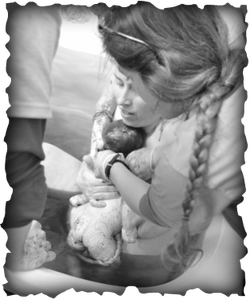 The Joyful Moment just after birth The Joyful Moment just after birth Birth bonding? I've done it six times! This one is pretty well accepted in American society, at least for vaginal births. But in case you've just emerged from subterranean life, bonding at birth makes breastfeeding easier and positively impacts the relationship between mother and baby for years to come, as well as helping to prepare your baby for healthy relationships with others. Having a doula present at your birth and after can be a great resource in helping you bond with baby, both because she can give you helpful bonding tips, as well as run errands so you and your spouse can focus on getting to know your baby. Most articles about birth bonding are quick to point out that missing bonding at birth doesn't doom you to a distant relationship with your child or curse your child to become the next dictator. So what to do if you miss that early bonding? Well, besides this little hug, pictured at the left, I missed early bonding with my little son, who had serious complications at birth and spent his first fifteen days in the NICU, only able to nurse for the first time about a week after birth. I am delighted to say that we both persevered and he's a happy, healthy, exclusively breastfed baby today. The keys to bonding with your baby, despite a delay, are to touch or be near your baby consistently, to talk with your baby, to be responsive to baby's cues, to get good support when your baby is ready to try breastfeeding, and to negotiate with your baby's health care providers for what's important to you, if need be.  Discreetly nursing one of my little ones Discreetly nursing one of my little ones Speaking of breastfeeding, yeah; it's amazing! I LOVE it and have breastfed six babies (in staggered shifts--not all at once!) for over 13 years, with only two breaks of about six weeks each when two of my children weaned at the end of a couple of my pregnancies. Pacifiers have been unnecessary, although I would admit that we've discovered their usefulness in the car with our sixth baby. ;) On the topic of pacifiers, It was the Couple to Couple League who first introduced us to "ecological breastfeeding," or what I call "natural breastfeeding." In a nutshell, natural breastfeeding is nursing your baby without the use of artificial nipples, with responsiveness to baby's cues, day and night. There are advantages to natural breastfeeding, as well as some cons, and this important, neglected topic is one I will address soon in another blog post. If you want tips for getting a good start or need help, attending a local La Leche League meeting is a great idea. I am also available as a peer counselor and experienced nursing mom! 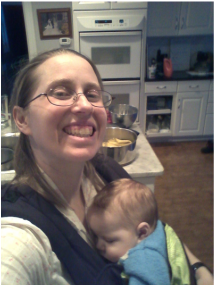 Preparing supper while holding baby! Preparing supper while holding baby! Babywearing? I can't get enough. I have worn my babies in backpacks, slings, frontpacks, and now, my brand new soft structured Boba. It's not only cuddly and sweet to wear your baby, it's the only way a busy mom can get things done, if you choose not to use swings or other baby gear! Here a shout-out to Baby Wearing International is appropriate. BWI has local chapters, including one in the Twin Cities area, where you can go and try on and even check out carriers before investing in them. What works for another mom and baby may not work for you at all, depending on body sizes, baby's age and stage of development and the reason you need or choose to babywear at any particular moment. BWI meetings are also a great opportunity to meet other AP moms, especially if you live in an area where attachment parenting isn't common.  First time I got to hold this sleeper without his feeding tube First time I got to hold this sleeper without his feeding tube Bedding in? I adore cuddling with my sleeping baby or toddler. Our children have been and continue to be consistently great sleepers at night, unless they are sick. Thus far, among our six kids, we have had no bed wetting and no night terrors, including our kids who have graduated from the family bed. And to clear things up--no; we don't continue to sleep with our children forever! The exact age of weaning from the family bed has been different with our various children, but regardless of age, we take as much pride in our children developing night-time independence as we do when they take their first steps, or say their first sentence, or paint their first piece of art.... Night-time independence happens gradually and naturally. Just as a child doesn't go from crawling to walking flawlessly in one day, night-time independence is a gradual process, as the child learns to sleep more deeply, to hold his bladder, how to cope with scary dreams, how to cope with the different sights and sounds of night, etc. It's a lot to learn and we as parents need to be patient and trusting as our children move through this process. Safety concerns? Click on the Dr. McKenna link above. While we do practice the family bed, safe bed sharing is important; and bed sharing is not for everyone. Many people find sleeping with baby in a sidecar arrangement (with a co-sleeper) works better for their family than bed sharing. Concerns about intimacy? We have six kids, people. Need I say more? Responsiveness to baby's cry? Yep. With our first, I responded at the first teeny whimper. Demands on my time are a lot more now than they were then, so it's true that I am not as much of a helicopter mom now as I was then. Yet if I do fail to reach the baby before he is crying, I like to hold him and validate his feelings of fear or sorrow, with words, sounds and body language meant to convey, 'I am here now; you are safe.' 'Beware of baby trainers.' This is simply the old old idea of letting the baby cry it out to train the baby to either stop using crying as a method of communication altogether because nobody is ever going to come, or, more commonly, letting the baby cry it out to train the baby to sleep through the night. Either way, the idea is to let the baby cry without picking up or sometimes even going to the baby. Keeping in mind my statement above about the fact that I truly believe that God gives a particular child to a particular family, and parents need to decide what type of parenting is best for their family, I do take issue with the cry it out strategy because it is rude. I wouldn't simply stand there while an older friend or family member were crying. I would at least attempt to help them or comfort them in some way. I fail to see how ignoring the tears of a very young person is any less rude. Enough said. 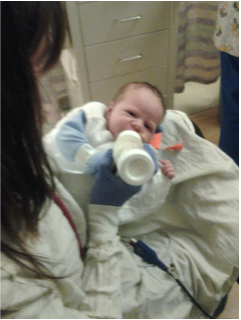 Baby getting his first bottle at age 9 days. Baby getting his first bottle at age 9 days. Finally, balance. This one eluded me till I was debilitated by postpartum anxiety, when we only had little ones in the house. It is hard for us perfectionistic moms to realize the following:
 With my baby and my preschooler asleep on either side, I am grateful especially to Sheila Kippley, one of the founders of CCL, now of Natural Family Planning International, for this quiet moment of beauty. It wouldn't have happened without her. It is my hope that I too can leave a legacy of quiet moments of beauty in the lives of my own children, and in the lives of other families I have been given the privilege to touch, whether in person or through the written word. I would love to hear how AP has influenced your life; contribute to the conversation by making a comment!  I don't usually blog about marriage, but since we Americans celebrate Valentine's Day today, my thoughts have drifted from their typical path of all things baby to romantic love...a straying that I grasp is not really all that far from the 'baby' path. We picture romantic love as Cupid, that mischievous cherub who flies bow in hand ready to let fly his arrows of Eros into the hearts of his unsuspecting victims. The lovers court, and in older versions of the tale, betroth, and in due course, find themselves face to face at the altar, pledging vows that are intended to last until one of them lies in a wooden box at that same altar. This summer, Chris and I will mark our 17th wedding anniversary, God willing. We married young (my sister commented that we looked like we were going to the Prom) and we have grown to middle age together. In those years, we have welcomed six babies into our home, battled pertussis, H1N1, multiple bouts of pneumonia, colic, pre-eclampsia, survived the NICU, lost five babies to miscarriage, moved seven times, paid off all our debts, accumulated more, have lived and still live with toddlers, live with a teen, and had four hundred eighty-nine thousand arguments, give or take...and apologized even more. I am still crazy in love with him, and in his less emotional way, he still loves me too. I hope this resume serves as sufficient life experience to allow you, dear reader, to trust that perhaps I have a little something to say about marriage. When cupid's arrow first penetrates your heart, you are certain that there was never one so perfect as your beloved. We all know this part. But then, in time, it is as if you get out your own bow, pull the arrow from your heart, and turn it against your beloved as a weapon. Where once you were the greatest paramours that the world had ever known, now you have become intimate enemies, noticing his faults with military precision; her vices with the cold-hearted stare of a general on campaign. You let fly your arrows of accusation, blame, bitter resentment, and disappointment. These misdirected arrows have doubtless killed many a marriage. I suspect that we were little different from the rest of the getting-married crowd in that we had no idea what we were getting ourselves into. 'Happily ever after' makes for a beautiful and satisfying conclusion to a fairy tale, but real human beings rarely experience endless happiness following their hand-in-hand departure from the shower of rice. I am an idealist and Chris is a realist. No little time--the unrepeatable currency of life--has been spent trying to reconcile my desires for the perfect (food, education for our children, manner of handling our finances, housing, parenting style, etc.) with Chris's comfort with the less-than-ideal but realistic. (No; we really couldn't buy that house that was $75,000 over our price range.) 'Marriage takes work,' they say. But somehow every starry eyed lover imagines that somehow theirs will escape this unromantic party-pooper truism. Until they meet Disillusionment. Chris and I began teaching classes for married and engaged couples before Chris could shave (well, close anyway). We were so green that every time we got to the Disillusionment part of the teaching notes, I was no little bit baffled. What was this cloudy figure Disillusionment we were supposed to promise that our students would confront? Disillusionment, I am sad to inform, is your neighbor, my dear friends. He is unnaturally tall and bony, and he always wears black. Unnervingly, he never knocks, but appears when you least expect him, right in the heart of your home. He makes himself comfortable, dirty boots planted firmly on your table, while he unthankingly gobbles up your food. He curses, spits, and asks for more. He smokes vile cheap cigars, which leave their stench about the house for hours after his departure. He uses your toilet--with the door open--never flushes and always leaves the seat up. When you least expect it you will find him in your garden, uprooting your most cherished and pampered plant, and will repeat this vandalism, no matter how many times you replant. Yet he is, to borrow a phrase, a severe mercy. If you let him do his work--if you both let him--you will find in time that the neighbor whom you once abhorred becomes a blessing in disguise. You find that he has not, in fact, eaten you out of house and home; no, he has simply devoured your selfish need to have everything done your way. The smoke you once hated has actually fumigated your heart of such loathsome pests as pride and unrighteous anger. Your neighbor's graceless habits have helped you develop patience. And his work in the garden, no matter how many times, clears away a noxious weed that stands in the way of you learning to love the very real and very imperfect spouse whom you actually and truly vowed to love till the day one of you died, no matter what. I get it now. Disillusionment is what happens when the rosy colored glasses are irrevocably smashed. The image of your spouse--the pampered plant sprouted in your head, transplanted in the needy soil of your heart, watered in the intensity of courtship, and fertilized by the heady bliss of your wedding day--is revealed to be nothing but a lovely but terribly false image, whose very existence was always about you and your own selfishness. The 'real' Chris would not require something as quotidian as sleep, but would rise effortlessly and joyfully in the middle of the night to ride off in sub-zero temperatures to purchase craved delicacies for his beloved pregnant wife. He would somehow manage to provide a bounty of financial blessings to effortlessly support an ever-burgeoning family while being home promptly at five every evening to tousle the hair of his first-born son and toss the baby in the air. He would never grow tired, or sick, or angry. He would be ever patient and never notice your impatience. He would happily encourage your habit of working on projects even if you "forgot" to make dinner or change the baby's diaper. He would uncomplainingly lay down whatever he was doing to run out to the store for that little something you forgot. He would forever be taken with your beauty and his passion would be expressed in love songs of praise and painstakingly worded poetry. In other words, he would be all-sufficient provider, humble servant, model husband, perfect father, and ardent lover whenever it suited. Disillusionment, my friends, is what happens when you realize that he (or she for you guy readers) isn't perfect, and that imperfection is never in the ways you expect, or hope for. He will disappoint you and usually in the very things that matter the most to you (that's why you notice). She will fail you. She will misunderstand. In the very ways you try the hardest to show your caring, she will horribly misinterpret and suspect and assume the worst of you and accuse you of selfishness. He (or she) will fail miserably to see his (or her) worst faults, but will somehow have eagle's eyes for yours. This is why there are vows, friends. Because 'for worse' can be pretty ugly. Ladies, it is 100% your responsibility to make your marriage work. Gents, it is 100% your responsibility to make your marriage work. Turn the arrow around. STOP noticing all the big and little ways he (or she) fails to be that false image you cultivated in the soil of your own selfish heart, and point the arrow at yourself. How can you be a better spouse today, this moment, with your next word, in your next breath? That is how happily ever after happens, dear friends. It begins when each one stops expecting the other to make it happen, and takes 100% responsibility for making it happen, not someday, but right here, right now. Love isn't pictured as an arrow in your heart for nothing. Real love will hurt you in a good way. It will transform you and perfect you--both of you. And then you really will live 'happily ever after.' |
Details
Archives
November 2023
Categories
All
Enter Your Email Address to get St. Croix Birth Blog Posts in Your Inbox(We don't collect your email address and you won't get anything else from us.)
|
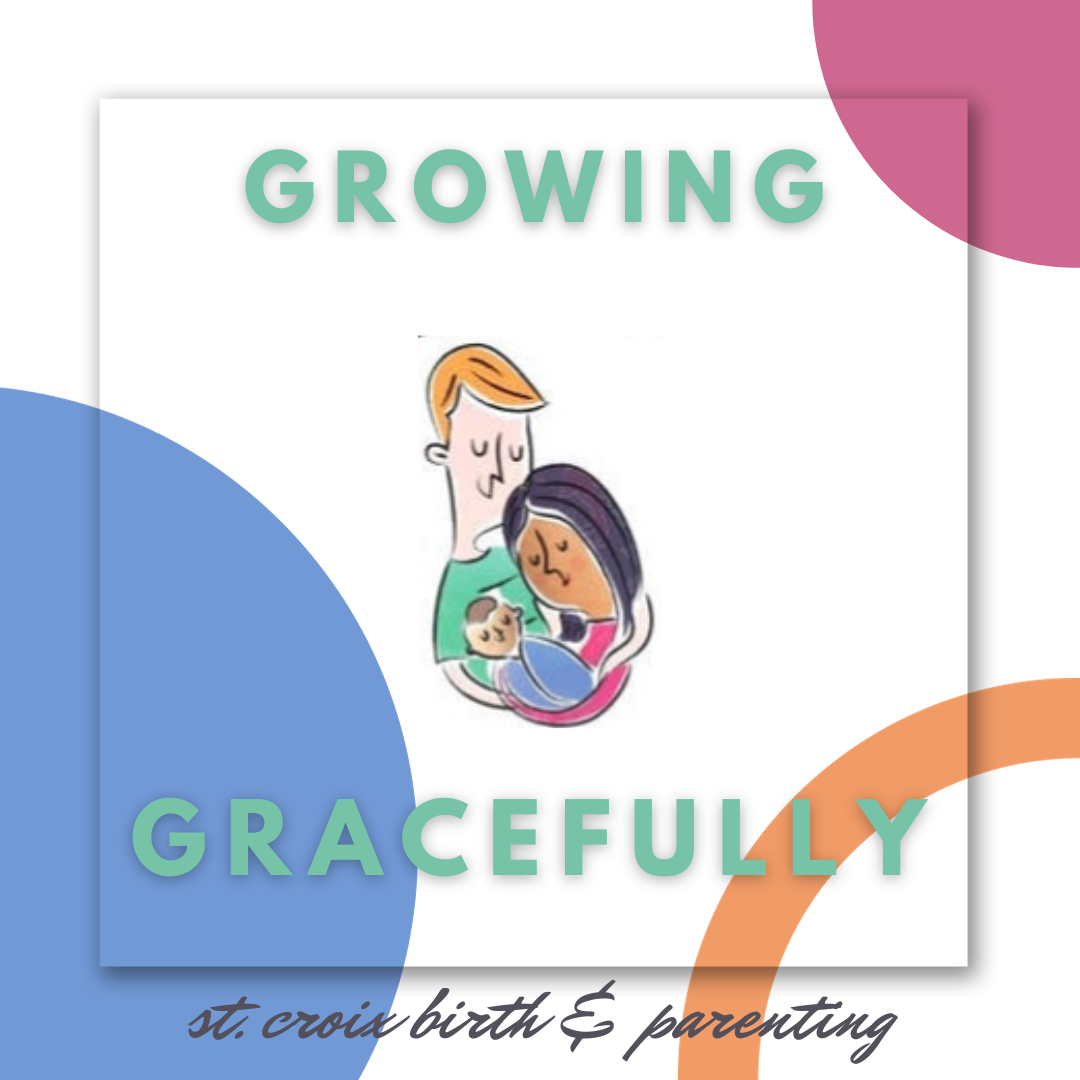

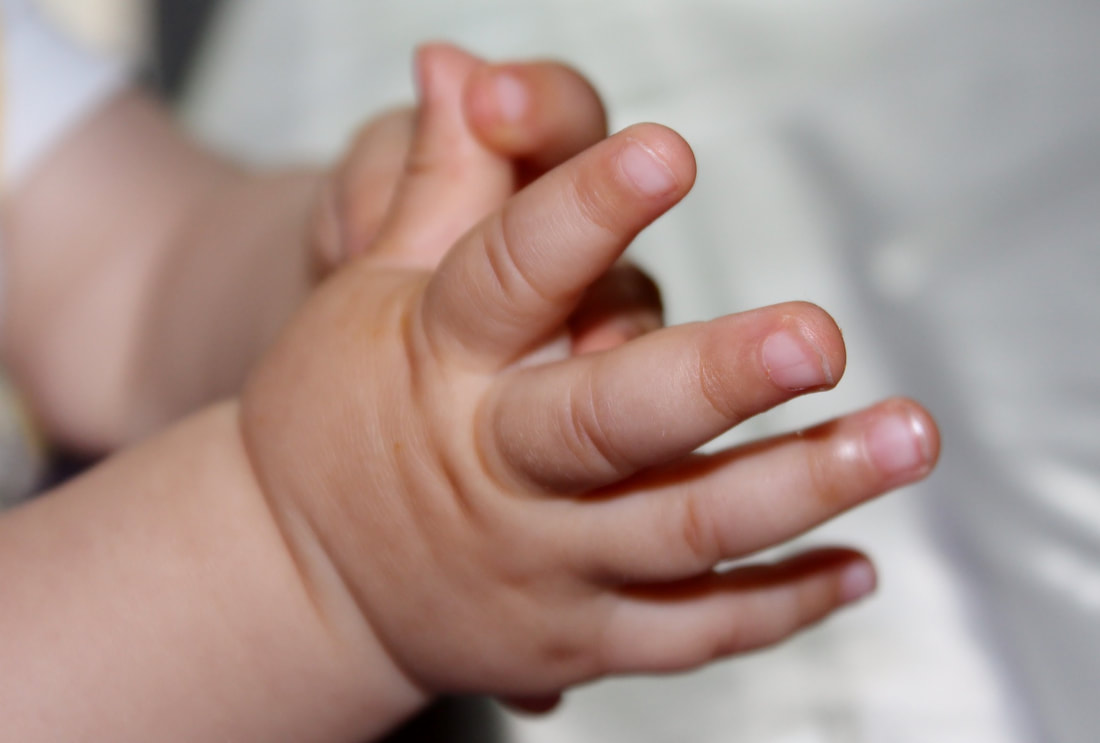




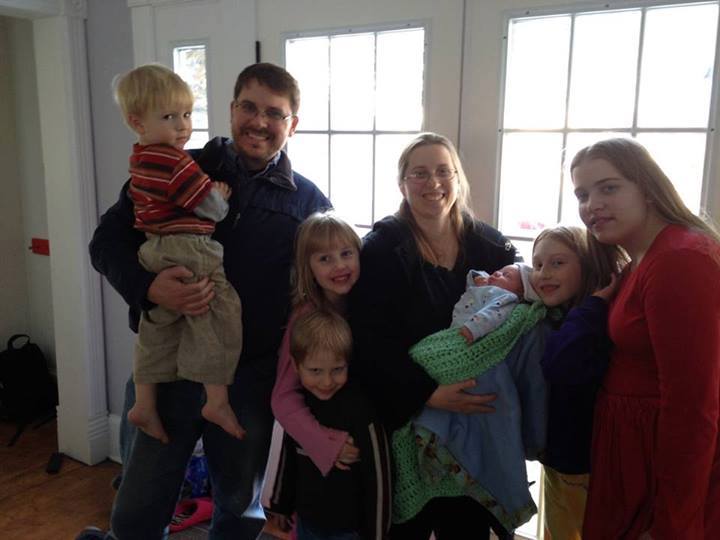
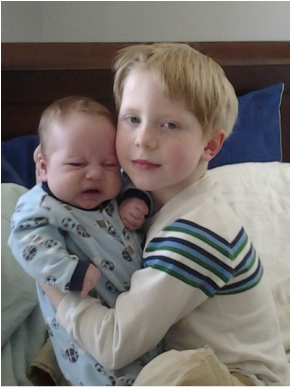

 RSS Feed
RSS Feed